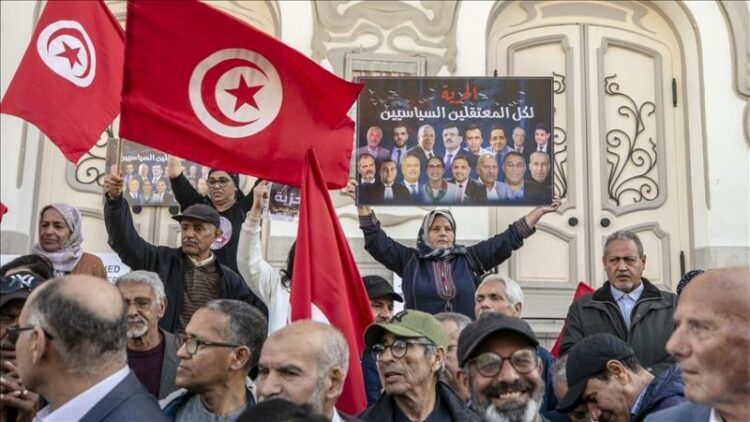A number of relatives and families of opposition political activists and lawyers imprisoned on charges of plotting against state security in Tunisia demonstrated in the vicinity of the civil prison in Mornaguia, near the capital, while the Defense Authority for Political Detainees called for the removal of the optical monitoring devices that were installed in the rooms of these detainees.
The demonstrators, coinciding with the breakfast time, raised slogans calling for the release of prisoners, and lifting what they described as the grievance imposed on them.
The participants also had breakfast near the prison in a movement of solidarity with the prisoners, and accused the Tunisian authorities and President Kais Saied of using the judiciary to liquidate his political opponents and fabricating false charges against them.
For his part, the leader of the Tunisian opposition National Salvation Front, Abdul Karim al-Harouni, stipulated, on Friday, the release of political prisoners detained since last February to stop the movement of the protest front.
Al-Harouni said, “We are in contact with the lawyers of the detainees and their families, and we are surprised to this day by the authorities’ continued silence and refusal to confront the truth of the charges against the opposionists who were isolated and imprisoned.”
He stressed that those in charge of prisons should “distinguish between political prisoners and prisoners of conscience, and the rest of the prisoners of public right.”
The participants in the vigil, which the Front called for, chanted slogans such as: “Freedom for all political detainees,” “No waiver of freedoms,” “Down with the coup,” and “No to military courts for civil cases.”
Until Friday evening, the Tunisian authorities did not comment on these accusations, but they usually deny them and affirm their commitment to freedoms and the independence of the judiciary.
Meanwhile, the Defense Authority for Political Detainees in Tunisia called on both the Ministry of Justice and the General Authority for Prisons to remove the optical monitoring devices that were installed in the residence rooms of political detainees.
The authority said – in a statement – that the installation of the monitoring devices was not based on any license from the Personal Data Protection Authority, which makes the procedure illegal, a violation of physical sanctity, and a form of psychological and moral torture that does not fall under the statute of limitations, according to the expression of the statement.
The commission expressed its readiness to engage in all forms of struggle and litigation in order to ensure the application of the law and the preservation of human dignity, as it put it.
The Defense Authority’s statement comes in response to a communiqué issued by the General Authority for Prisons and Reform, on Thursday, in which it considered that the monitoring devices were established in accordance with the law in force and based on the license granted by the Authority for the Protection of Personal Data, and that it aims to protect all those in prison from any attack and to ensure urgent intervention when occurrence of any emergency, calling for distancing it from all disputes, whatever their nature or source, as it put it.



